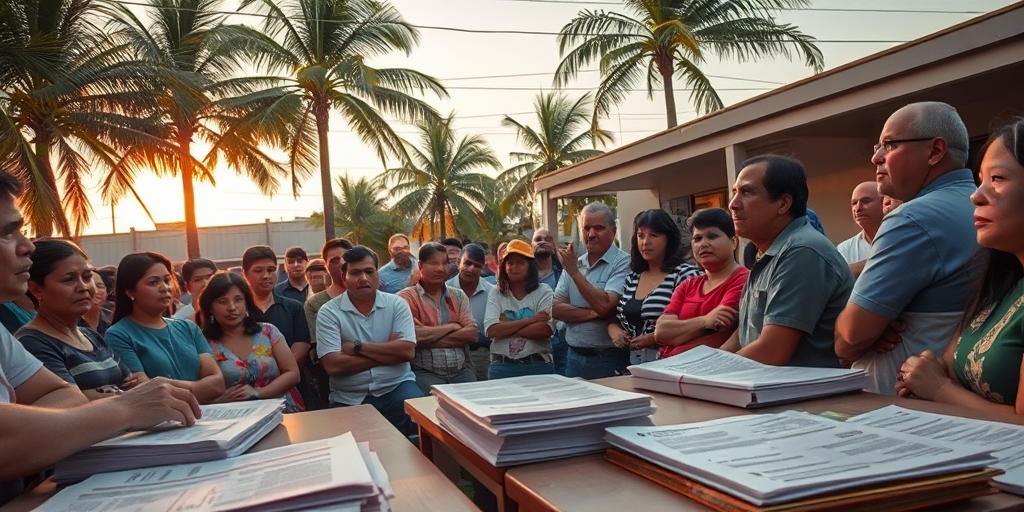Congressman Gonzalez Denounces Republicans’ Dangerous Rescissions Legislation
In a passionate response to recent legislative maneuvers in Washington, Congressman Vicente Gonzalez has openly criticized the Republican-backed rescissions legislation that threatens to reverse critical federal funds intended for disaster preparedness. This move, according to Gonzalez, jeopardizes public safety and places additional economic burdens on the nation.
Legislative Controversy: Safety at Stake
The rescissions legislation aims to cut back on federal spending by retracting allocated funds, a decision Rep. Gonzalez argues compromises the ability of communities to prepare for and respond to natural disasters. “In the dead of night, Republicans voted to claw back federal funding that was already allocated and approved to better not just the American people, but the rest of the world,” said Gonzalez. This legislation, he claims, is especially detrimental to regions like the Rio Grande Valley (RGV), which regularly faces the brunt of natural calamities such as hurricanes and floods.
Federal Funding’s Role in Disaster Preparedness
The significance of federal funding lies in its ability to provide essential services during emergencies. For instance, public radio and television often serve as vital communication channels during crises. The legislation’s rollback of funds for such services could hinder effective information dissemination during disasters.
Additionally, the RGV, being prone to severe weather events, relies heavily on these resources. In a region where rapid and clear communication can mean the difference between life and death, the potential withdrawal of funding presents a grave concern for Valley residents.
Local Impact: A Community’s Response
The effects of this legislation could ripple through South Texas. Local leaders and residents have voiced concerns about the legislation’s implications. Maria Lopez, a community organizer in Hidalgo County, worries about the local impact. “We’re on the front lines when hurricanes hit. Losing support could leave our community vulnerable. That’s not a risk any of us should be taking,” Lopez stated.
In contrast to this federal pullback, the recent implementation of new higher education provisions by the U.S. Department of Education, including a $250,000 Project SERV grant, marks a positive shift towards addressing community needs. This grant is set to support areas in Texas affected by recent flooding, underlining the importance of targeted federal assistance.
Connections to Past and Ongoing Issues
The Rio Grande Valley’s struggles with disaster preparedness are not new. Historical floods and hurricanes have repeatedly tested the region’s resilience. Past events highlight the critical necessity for steady, reliable federal support structures. For Gonzalez and many locals, the rescissions legislation seems like a step backwards in managing these challenges effectively.
Looking Ahead: Potential Implications
The legislation, if passed, could set a precedent affecting future federal funding decisions. Congressman Gonzalez has emphasized that these actions, justified under the guise of fiscal responsibility, paradoxically contribute to the national debt and overlook essential services’ value.
The long-term concerns are clear: reduced funding might not only impede emergency readiness but also slow economic growth in disaster-prone areas by deterring investment and development. The ensuing instability might lead to broader socio-economic challenges for the RGV community.
Balancing Perspectives on the Issue
While Gonzalez and local leaders criticize the decision, proponents argue that budget cuts are necessary to manage the nation’s fiscal health. However, it remains a contentious point whether these specific cuts serve the greater public interest. Some economic experts suggest exploring alternative cost-saving strategies that do not compromise critical safety nets.
Engaging the Community: Resources and Actions
As part of ongoing efforts to ensure community safety and engagement, RGV residents are encouraged to reach out to local representatives and participate in public discussions. Community meetings and online forums can provide platforms for discussion, allowing residents to voice their concerns and advocate for sustained federal support.
Moreover, for those seeking immediate assistance or information, several local organizations and government offices remain active resources. Valley residents are urged to stay informed through trusted media outlets such as Texas Border Business and to leverage platforms like MeGustaTV for updates on disaster preparedness and legislative developments.
Conclusion
Congressman Gonzalez’s denouncement of the rescissions legislation underscores a critical debate over federal funding priorities, particularly in regions vulnerable to natural disasters. As the RGV navigates this complex policy landscape, the emphasis on community interest and local impact remains vital. It is a reminder of the delicate balance between fiscal policy and public safety, echoing the ongoing need for vigilant advocacy and informed civic engagement among Valley residents.







